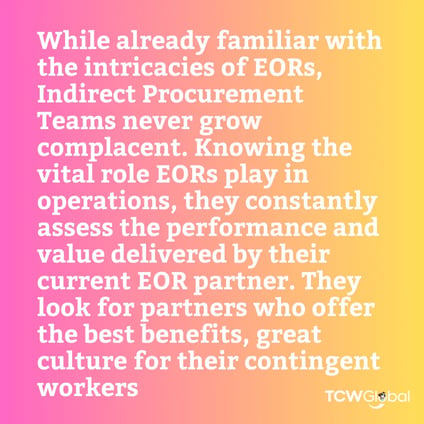20 Things Great Indirect Procurement Teams Don't Do

November 16, 2023

Indirect procurement teams play a critical role in maintaining operational efficiency and optimizing costs. Their ability to sidestep common pitfalls can mean the difference between a good team and a great one. In this blog, we'll explore the 20 things that great indirect procurement teams conscientiously avoid doing. From never neglecting negotiations to always keeping an eye on the latest technology trends, these teams understand that it's not just about cutting costs but also about fostering relationships, optimizing service contracts, and staying ahead of the curve. Join us as we delve into the practices that set these teams apart and ensure their organizations thrive in an ever-evolving marketplace.
-
Neglect Negotiating with Suppliers
Indirect Procurement Teams know the value of relationship-building. They never shy away from approaching suppliers for possible discounts. They understand that a slight change in purchasing habits, like increasing order volume, can open doors for higher discounts. -
Never Auto-Renewing Contracts, Always Evaluating
Indirect Procurement Teams are always on their toes when it comes to service contracts. They never just let contracts auto-renew without reassessing if better terms or providers are available. -
Neglect Relationship-Building with Service Providers
A good relationship with service providers can mean better rates and terms. They never miss an opportunity to nurture these relationships for long-term benefits. -
Fail to Optimize Employer of Record Services.
While already familiar with the intricacies of EORs, Indirect Procurement Teams never grow complacent. Knowing the vital role EORs play in operations, they constantly assess the performance and value delivered by their current EOR partner. They look for partners who offer the best benefits, great culture for their contingent workers and align best with their own company values. opportunities to renegotiate terms, enhance efficiency, or streamline processes, ensuring the relationship remains adaptive to the organization's changing needs and maintains the highest standards of compliance and cost-effectiveness. -
Oversee Without Metrics
They always have a set of KPIs to measure the efficiency of indirect spends. Whether it's reducing software licensing costs or optimizing facilities management, metrics guide their decisions, -
Isolate Training and Development
For them, upskilling the team is always a priority. They make sure that everyone is on the same page when it comes to best practices in indirect procurement. -
Disregard Travel and Expense Optimizations
They constantly review and refine travel and expense policies to ensure cost efficiencies while not compromising employee comfort. -
Ignore Technology Trends.
From cloud solutions to SaaS products, Indirect Procurement Teams are always on the lookout for the latest tools to optimize operations and reduce costs. -
Overlook Employment Laws and Regulations
Great indirect procurement teams do not neglect the intricate web of local, state, and national employment laws when utilizing employer of record services. They ensure that these services are always in compliance with the relevant labor laws, tax regulations, and benefit obligations, avoiding potential legal pitfalls and penalties.

-
Overlook Inter-Departmental Collaborations
They know the importance of aligning with other departments to understand their indirect needs better, ensuring seamless operations and cost savings. -
Ignore Feedback on Service Providers
Feedback from internal stakeholders on service providers is gold. They constantly gather and act on it to improve service levels and renegotiate terms. -
Keep Data In Silos
Integrating data across various indirect spends, from IT to HR, helps in better analytics and forecasting. They always ensure data integration for better insights. -
Over-Rely on a Single Service Provider
They never put the organization at risk by over-relying on one service provider, always ensuring that there's a backup or secondary option available. -
Skip Digital Advancements
E-procurement and digital solutions are at the heart of modern indirect procurement. Teams leverage these tools for more transparency, better rates, and streamlined operations. -
Neglect Cross-Training
Indirect Procurement Teams understand the importance of flexibility and knowledge sharing. They don't let teams work in isolation, ensuring cross-training so that members can handle various indirect procurement tasks when needed. -
Avoid revisiting contract benchmarks
They regularly revisit benchmarks set in service contracts to ensure they are still relevant and competitive, ensuring the organization always gets the best value. -
Overlook Communication Strategies.
Clear communication with stakeholders, service providers, and internal teams is pivotal. Indirect Procurement Teams never underestimate the power of clear and consistent communication. -
Disregard Vendor Performance Reviews
Rather than waiting for a contract to end or a problem to arise, they constantly monitor and review vendor performance, ensuring consistent service quality and addressing issues proactively. -
Neglect Their Internal Relationships with Buyers
Great indirect procurement teams recognize that their effectiveness isn't just about external negotiations. A lack of communication can lead to misunderstandings or missed opportunities. For example, buyers might be aware of certain market trends, new products, or alternative solutions that the team is not. Regular interactions can facilitate the exchange of such valuable insights. -
Make savings a team effort
Having the right stakeholders draw up purchase orders doesn’t always ensure the right products are purchased (cost-wise). So make sure everyone is on the same page and encourage the team to save money whenever possible.
Final Thoughts
It's evident that the journey towards excellence is ongoing and often complex. Whether it's navigating the intricacies of payrolling, refining HR processes, or managing a remote workforce, the path to optimization is multifaceted. If your team is seeking to enhance its operations and tackle these challenges head-on, reach out to TCWGlobal. Our expertise in handling the diverse needs of remote workforces, including payrolling and HR services, can provide you with the tailored support and innovative solutions necessary to elevate your team's performance.
Partner with TCWGlobal and empower your procurement team. Visit tcwglobal.com and discover how a partnership with TCWGlobal can propel your procurement team to new heights, ensuring you stand out as a model of efficiency for all your employer of record needs.
Need Help?
Whether you need expertise in Employer of Record (EOR) services, Managed Service Provider (MSP) solutions, or Vendor Management Systems (VMS), our team is equipped to support your business needs. We specialize in addressing worker misclassification, offering comprehensive payroll solutions, and managing global payroll intricacies.
From remote workforce management to workforce compliance, and from international hiring to employee benefits administration, TCWGlobal has the experience and resources to streamline your HR functions. Our services also include HR outsourcing, talent acquisition, freelancer management, and contractor compliance, ensuring seamless cross-border employment and adherence to labor laws.
We help you navigate employment contracts, tax compliance, workforce flexibility, and risk mitigation, all tailored to your unique business requirements. Contact us today at tcwglobal.com or email us at hello@tcwglobal.com to discover how we can help your organization thrive in today's dynamic work environment. Let TCWGlobal assist with all your payrolling needs!
